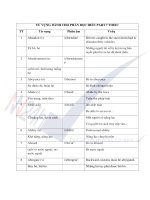TỪ VỰNG TOEIC unit 1
Bạn đang xem bản rút gọn của tài liệu. Xem và tải ngay bản đầy đủ của tài liệu tại đây (253.73 KB, 61 trang )
Unit 1
BENE AM BELL PAC CRIM PROB GRAV LEV Words from Mythology
and History
Quiz 1-1 Quiz 1-2 Quiz 1-3 Quiz 1-4 Quiz 1-5 Review Quizzes 1
BENE is Latin for “well.” A benefit is a good result or effect. Something
beneficial produces good results or effects. The Latin root can be heard in
other languages as well: “Good!” or “Fine!” in Spanish is “Bueno!”; in
French, it's “Bon!”; and in Italian, just say “Bene!”
benediction
A prayer that asks for God's blessing,
especially a prayer that concludes a worship service.
• The moment the bishop had finished his benediction, she squeezed quickly
out of her row and darted out the cathedral's side entrance.
In benediction, the bene root is joined by another Latin root, dictio,
“speaking” (see DICT), so the word's meaning becomes something like
“well-wishing.” Perhaps the best-known benediction is the so-called Aaronic
Benediction from the Bible, which begins, “May the Lord bless you and keep
you.” An important section of the Catholic Mass was traditionally known as
the Benedictus, after its first word (meaning “blessed”). It was St. Benedict
who organized the first Christian monasteries; many Christians have been
baptized Benedict in his honor, and 16 popes have taken it as their papal
name.
benefactor
especially by giving money.
Someone who helps another person or group,
• An anonymous benefactor had given $15 million to establish an ecological
institute at the university.
A benefactor may be involved in almost any field. One may endow a
scholarship fund; another may give money to expand a library; still another
may leave a generous sum to a hospital in her will. The famous benefactions
of John D. Rockefeller included the gifts that established the University of
Chicago, the Rockefeller Foundation, and Rockefeller University. Many
benefactors have reported that giving away their money turned out to be the
most rewarding thing they ever did.
beneficiary
A person or organization that benefits or
is expected to benefit from something, especially one that receives money or
property when someone dies.
• Living in a trailer in near-poverty, she received word in the mail that her
father had died, naming her as the sole beneficiary of his life-insurance
policy.
Beneficiary is often used in connection with life insurance, but it shows up in
many other contexts as well. A college may be the beneficiary of a private
donation. Your uncle's will may make a church his sole beneficiary, in which
case all his money and property will go to it when he dies. A “third-party
beneficiary” of a contract is a person (often a child) who the people signing
the contract (which is usually an insurance policy or an employee-benefit
plan) want to benefit from it. In a more general way, a small business may be
a beneficiary of changes to the tax code, or a restaurant may be the
beneficiary when the one across the street closes down and its whole lunch
crowd starts coming in.
benevolence
Kindness, generosity.
• In those financially desperate years, the young couple was saved only by the
benevolence of her elderly great-uncle.
Part of benevolence comes from the Latin root meaning “wish.” The novels
of Charles Dickens often include a benevolent figure who rescues the main
characters at some point—Mr. Brownlow in Oliver Twist, Abel Magwitch in
David Copperfield, Mr. Jarndyce in Bleak House, Ebenezer Scrooge in A
Christmas Carol. To be benevolent, it helps to have money, but it's not
necessary; kind assistance of a nonfinancial sort may turn out to be lifesaving
benevolence as well.
AM comes from the Latin amare, “to love.” The Roman god of love was
known by two different names, Cupid and Amor. Amiable means “friendly or
good-natured,” and amigo is Spanish for “friend.”
amicable
Friendly, peaceful.
• Their relations with their in-laws were generally amicable, despite some
bickering during the holidays.
Amicable often describes relations between two groups, or especially two
nations—for example, the United States and Canada, which are proud of
sharing the longest unguarded border in the world. So we often speak of an
amicable meeting or an amicable settlement. When amicable describes more
personal relations, it may indicate a rather formal friendliness. But it's always
nice when two friends who've been quarreling manage to have an amicable
conversation and to say amicable good-byes at the end.
enamored
Charmed or fascinated; inflamed with love.
• Rebecca quickly became enamored of the town's rustic surroundings, its
slow pace, and its eccentric characters.
Computer hackers are always enamored of their new programs and games.
Millions of readers have found themselves enamored with Jane Austen's
novels. And Romeo and Juliet were, of course, utterly enamored of each
other. But we also often use the word in negative contexts: A friend at work
may complain that she's not enamored of the new boss, and when you start
talking about how you're not enamored with the neighbors it may be time to
move. (Note that both of and with are commonly used after enamored.)
amorous
love.
Having or showing strong feelings of attraction or
• It turned out that the amorous Congressman had gotten his girlfriend a good
job and was paying for her apartment.
A couple smooching on a park bench could be called amorous, or a young
married couple who are always hugging and kissing. But the word is often
used a bit sarcastically, as when a tabloid newspaper gets hold of some
scandalous photos and calls the participants “the amorous pair.” In such
cases, we may be encouraged to think the attraction is more physical than
emotional.
paramour
custom.
A lover, often secret, not allowed by law or
• He had been coming to the house for two years before her brothers realized
that he was actually the paramour of their shy and withdrawn sister.
Paramour came to English from French (a language based on Latin), though
the modern French don't use the word. Since par amour meant “through
love,” it implies a relationship based solely on love, often physical love,
rather than on social custom or ceremony. So today it tends to refer to the
lover of a married man or woman, but may be used for any lover who isn't
obeying the social rules.
Quiz 1-1
A. Choose the closest synonym:
1. beneficiary
a. benefit b. prayer c. recipient d. contributor
2. amorous
a. friendly b. sympathetic c. loving d. kind
3. benediction
a. blessing b. gift c. saint d. favor
4. amicable
a. difficult b. friendly c. curious d. lazy
5. enamored
a. strengthened b. engaged c. fond d. free
6. benefactor
a. supporter b. priest c. donation d. kindness
7. paramour
a. lover b. husband c. heaven d. affection
8. benevolence
a. value b. kindness c. luck d. approval
Answers
B. Complete the analogy:
1. charming : enchanting :: amorous : ___
a. sublime b. pleasant c. likeable d. passionate
2. greeting : farewell :: benediction : ___
a. motto b. speech c. curse d. saying
3. lender : borrower :: benefactor : ___
a. giver b. beneficiary c. participant d. partner
4. gentle : tender :: enamored : ___
a. lively b. charmed c. cozy d. enraged
5. liking : appreciation :: benevolence : ___
a. opinion b. sentimentality c. interest d. generosity
6. frozen : boiling :: amicable : ___
a. calm b. comfortable c. shy d. unfriendly
7. patient : doctor :: beneficiary : ___
a. tycoon b. investor c. lover d. benefactor
8. friend : companion :: paramour : ___
a. lover b. theater c. mother d. wife
Answers
BELL comes from the Latin word meaning “war.” Bellona was the littleknown Roman goddess of war; her husband, Mars, was the god of war.
antebellum
Existing before a war, especially before the
American Civil War (1861–65).
• When World War I was over, the French nobility found it impossible to
return to their extravagant antebellum way of life.
Even countries that win a war often end up worse off than they had been
before, and the losers almost always do. So antebellum often summons up
images of ease, elegance, and entertainment that disappeared in the postwar
years. In the American South, the antebellum way of life depended on a
social structure, based on slavery, that collapsed after the Civil War;
Margaret Mitchell's Gone with the Wind shows the nostalgia and bitterness
felt by wealthy Southerners after the war more than the relief and anticipation
experienced by those released from slavery. In Europe, World War I
shattered the grand life of the upper classes, even in victorious France and
Britain, and changed society hugely in the space of just four years.
bellicose
Warlike, aggressive, quarrelsome.
• The more bellicose party always got elected whenever there was tension
along the border and the public believed that military action would lead to
security.
Since bellicose describes an attitude that hopes for actual war, the word is
generally applied to nations and their leaders. In the 20th century, it was
commonly used to describe such figures as Germany's Kaiser Wilhelm,
Italy's Benito Mussolini, and Japan's General Tojo, leaders who believed their
countries had everything to gain by starting wars. The international relations
of a nation with a bellicose foreign policy tend to be stormy and difficult, and
bellicosity usually makes the rest of the world very uneasy.
belligerence
Aggressiveness, combativeness.
• The belligerence in Turner's voice told them that the warning was a serious
threat.
Unlike bellicose and bellicosity, the word belligerence can be used at every
level from the personal to the global. The belligerence of Marlon Brando's
performances as the violent Stanley Kowalski in A Streetcar Named Desire
electrified the country in the 1940s and '50s. At the same time, belligerent
speeches by leaders of the Soviet Union and the United States throughout the
Cold War were keeping the world on edge. Belligerent is even a noun; the
terrible war in the Congo in recent years, for example, has involved seven
nations as belligerents.
rebellion
Open defiance and opposition, sometimes armed, to a
person or thing in authority.
• A student rebellion that afternoon in Room 13 resulted in the new substitute
teacher racing out of the building in tears.
Plenty of teenagers rebel against their parents in all kinds of ways. But a
rebellion usually involves a group. Armed rebellions are usually put down by
a country's armed forces, or at least kept from expanding beyond a small area.
The American War of Independence was first viewed by the British as a
minor rebellion that would soon run its course, but this particular rebellion
led to a full-fledged revolution—that is, the overthrow of a government.
Rebellion, armed or otherwise, has often alerted those in power that those
they control are very unhappy.
PAC is related to the Latin words for “agree” and “peace.” The Pacific
Ocean—that is, the “Peaceful Ocean”—was named by Ferdinand Magellan
because it seemed so calm after he had sailed through the storms near Cape
Horn. (Magellan obviously had never witnessed a Pacific typhoon.)
pacify
action.
(1) To soothe anger or agitation. (2) To subdue by armed
• It took the police hours to pacify the angry demonstrators.
Someone stirred up by a strong emotion can usually be pacified by some kind
words and the removal of its causes. Unhappy babies are often given a rubber
pacifier for sucking to make them stop crying. During the Vietnam War,
pacification of an area meant using armed force to drive out the enemy,
which might be followed by bringing the local people over to our side by
building schools and providing social services. But an army can often bring
“peace” by pure force, without soothing anyone's emotions.
pacifist
A person opposed to war or violence, especially
someone who refuses to bear arms or to fight, on moral or religious grounds.
• Her grandfather had fought in the Marines in World War II, but in his later
years he had become almost a pacifist, opposing every war for one reason or
another.
The Quakers and the Jehovah's Witnesses are pacifist religious groups, and
Henry David Thoreau and Martin Luther King are probably the most famous
American pacifists. Like these groups and individuals, pacifists haven't
always met with sympathy or understanding. Refusing to fight ever, for any
reason, calls for strong faith in one's own moral or religious convictions,
since pacifism during wartime has often gotten people persecuted and even
thrown in prison.
pact
An agreement between two or more people or groups; a treaty or
formal agreement between nations to deal with a problem or to resolve a
dispute.
• The girls made a pact never to reveal what had happened on that terrifying
night in the abandoned house.
Pact has “peace” at its root because a pact often ends a period of unfriendly
relations. The word is generally used in the field of international relations,
where diplomats may speak of an “arms pact,” a “trade pact,” or a “fishingrights pact.” But it may also be used for any solemn agreement or promise
between two people; after all, whenever two parties shake hands on a deal,
they're not about to go to war with each other.
pace
Contrary to the opinion of.
• She had only three husbands, pace some Hollywood historians who claim
she had as many as six.
This word looks like another that is much more familiar, but notice how it's
pronounced. It is used only by intellectuals, and often printed in italics so that
the reader doesn't mistake it for the other word. Writers use it when
correcting an opinion that many people believe; for example, “The costs of
the program, pace some commentators, will not be significant.” So what does
pace have to do with peace? Because it says “Peace to them (that is, to the
people I'm mentioning)—I don't want to start an argument; I just want to
correct the facts.”
Quiz 1-2
A. Match the word on the left to the correct definition on the right:
1. antebellum a. quarrelsome
2. pace
b. solemn agreement
3. rebellion
c. to make peaceful
4. pacify
d. before the war
5. pacifist
e. aggressiveness
6. belligerence f. opposition to authority
7. pact
g. contrary to the opinion of
8. bellicose
h. one who opposes war
Answers
B. Fill in each blank with the correct letter:
a. antebellum
b. pacifist
c. pact
d. pace
e. rebellion
f. bellicose
g. pacify
h. belligerence
1. The native ___ began at midnight, when a gang of youths massacred the
Newton family and set the house afire.
2. The grand ___ mansion has hardly been altered since it was built in 1841.
3. The Senate Republicans, outraged by their treatment, were in a ___ mood.
4. ___ some of the younger scholars, no good evidence has been found that
Japan was involved in the incident .
5. The cease-fire ___ that had been reached with such effort was shattered by
the news of the slaughter.
6. Their relations during the divorce proceedings had been mostly friendly, so
his ___ in the judge's chambers surprised her.
7. The world watched in amazement as the gentle ___ Gandhi won India its
independence with almost no bloodshed.
8. Her soft lullabies could always ___ the unhappy infant.
Answers
CRIM comes from the Latin words for “fault or crime” or “accusation.” It's
obvious where the root shows up most commonly in English. A crime is an
act forbidden by the government, which the government itself will punish
you for, and for which you may be branded a criminal. A crime is usually
more serious than a tort (see TORT), a “civil wrong” for which the wronged
person must himself sue if he wants to get repaid in some way.









